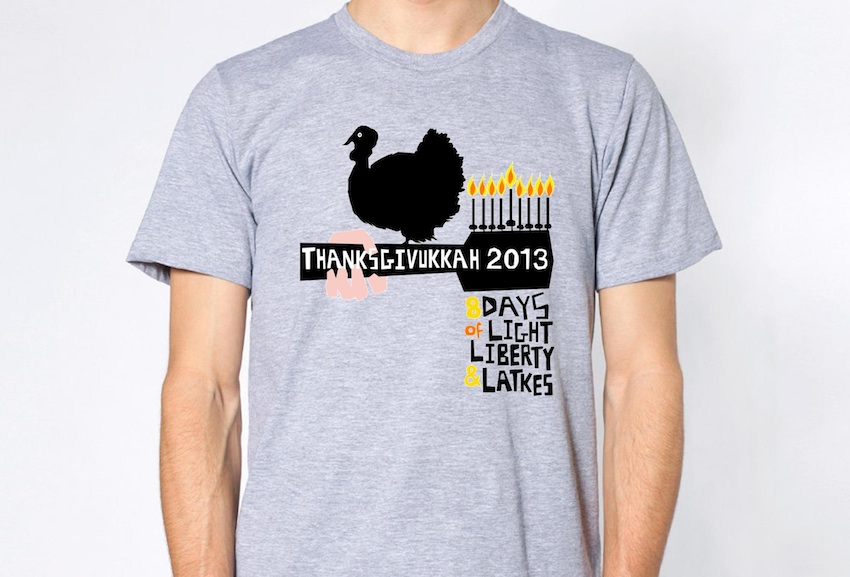Thanksgivukkah: Massachusetts Is Embracing a Once-In-a-Lifetime Holiday
Menurkeys—that’s a turkey-shaped menorah—and potato-latke-stuffed poultry are just a few of the festivities that mark the merging of two important holidays at the end of November.
In what is being called a “once-in-a-lifetime” scenario, Thanksgiving and Hanukkah will fall on the same day this year—for the first time since the late 1800s—and the idea is being embraced around the country.
From BuzzFeed to Stephen Colbert, everyone seems to be talking about “Thanksgivukkah,” as it has come to be known, and Rabbi David Paskin, co-head of the Kehillah Schechter Academy in Norwood, says Massachusetts had a lot to do with the holiday’s national recognition.
“Thanksgiving is something in our state that we should be celebrating, and as Jews, if we can brighten that up with the light of Hanukkah, that’s what we would like to do,” says Paskin of the makeshift holiday, which started as a concept at his school. Others had it on their radar, but the term was trademarked in Massachusetts.
Last spring, Dana Gitell, a parent of one of Paskin’s students at the Norwood school, came to the Rabbi and brought up the fact that the two holidays would fall on the same day, Thursday, November 28. “I was aware of the confluence from looking at the calendars, and as soon as I realized, the word [Thanksgivukkah] just came to me,” says Gitell.
The rare holiday combination happens because of the lunar cycle followed by the Jewish calendar, explains Paskin. Because the calendar’s ties to the moon’s cycle, rather than the sun’s, holidays fall on different days depending on the year.
Jonathan Mizrahi, who has a Ph.D. in physics from the University of Maryland, explained the phenomenon to ThanksgivukkahBoston.com, in great detail:
The Jewish calendar is mathematical in nature; it’s not determined by a person. It is designed so that the months line up with the lunar cycle, while the years stay synced with the solar cycle … The calendar’s synchronization with the solar year is not perfect. The calendar is drifting forward with respect to the solar cycle at a rate of four days every 1,000 years. Right now, the earliest that the first day of Hanukkah can fall is November 28. Coincidentally, this is also the latest that Thanksgiving can fall.
A similar occurrence and convergence of the two major holidays isn’t expected to happen for another 76,000 years, Paskin says, which makes the celebration worth the recognition. “It’s an amazing opportunity to teach children how lucky they are to live in a country that they can celebrate fully as both secular Americans, and as committed Jews. You can’t do that everywhere in the world,” he says.
Realizing that the opportunity was there, Paskin decided to write a song about the holiday, and recently made a music video to go along with it with the kids from his school.
Meanwhile, Gitell wasted no time jumping online and creating accompanying Facebook and Twitter accounts for Thanksgivukkah, which garnered country-wide attention. She even trademarked the term, and has partnered with online Judaica retailer Moderntribe.com to offer holiday gifts like T-shirts and greeting cards, to go along with the theme. Boston-based Combined Jewish Philanthropies also joined in to create ThanksgivvukahBoston.com, and jam-pack the site with recipes, ways to celebrate, and more.
Before she knew it, it just took off. “I sort of always thought that it could go national, outside of the Jewish world, from a pop-culture standpoint, that is. But the recognition has been overwhelming. It’s really shocking,” she says. “It’s exciting. I think people would have realized the holidays were happening, but if I could play a role in elevating awareness about it, or creating excitement about it, then that’s great.”
Gitell says initially it was meant to just be “fun,” but she realized the potential to really inject the importance of both holidays into the minds of a lot of people. “My first instinct was that it was funny, and that there were all kinds of combinations of food, or entertaining games we could make up, but I also realized that it’s not just Jews celebrating on the same day as the rest of America—it’s a chance to give thanks to America for making a Jewish-American experience possible, too.”
Gitell says there are common themes in both Hanukkah and Thanksgiving about religious and individual freedoms, making it a special opportunity for Jewish Americans to celebrate and give thanks to the country.
Paskin has been hard at work to get the word out, too. Besides his song, which is getting thousands of hits online per day, he’s been working with state elected officials to bring even more prominence to the rare confluence of historically recognized traditions. State Representative Lou Kafka and Paskin are planning on hosting a gathering, sometime close to Thanksgivukkah, complete with a turkey-shaped menorah to give to representatives to put in the State House.
There are even rumors that Mayor Tom Menino could proclaim the once-in-a-lifetime-celebration an official day in Boston—but those are just rumors for now. “If he doesn’t do it, I am a Rabbi and I can do whatever I want. So I will declare it Thanksgivukkah,” Paskin joked.



